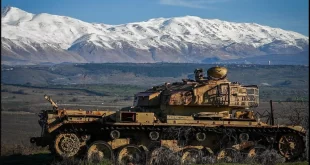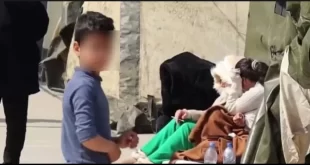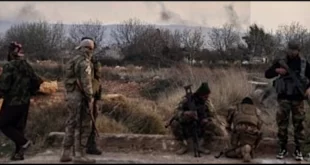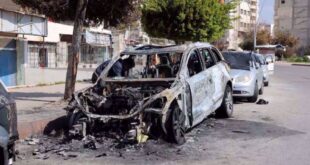Nov 27, 2014, Al Akhbar
Russia asserted Wednesday it would continue to support Syrian President Bashar al-Assad in his war on “terrorism,” reaffirming, however, Moscow’s unwavering disapproval of coercive violence being used to solve the Syrian conflict.
Russian President Vladimir Putin and Foreign Minister Sergey Lavrov held talks with Syria’s Foreign Minister Walid al-Moallem in Russia’s Black Sea resort of Sochi Wednesday, as part of Moscow’s renewed diplomatic push to restart peace talks on Syria.
The Kremlin said the meeting between Putin and Moallem “was devoted to Russian-Syrian relations,” but provided no other details.
Meanwhile, in a joint news conference with Moallem, Lavrov restated Moscow’s belief that the solution of the crisis in Syria could only be reached through political means, but said all “healthy” Syria forces must first and foremost unite and battle “terrorism.”
“Both countries [Syria and Russia] agree that the most eminent threat in the region right now is that of the terrorist groups,” the Russian FM stated, according to the Syrian Arab News Agency (SANA).
“Russia will continue to support Syria in countering this threat,” he affirmed, indicating that there was no room for compromise on the issue of “terrorism” in the Syrian conflict.
Russia has been a steady ally of Assad throughout the almost four-year conflict but has heightened its support for the government after the rise and expansion of Islamist rebel groups, including the notorious Islamic State of Iraq and Syria (ISIS) group.
ISIS, which declared a “caliphate” over territory it seized in Iraq and Syria, has so far executed thousands in Iraq and Syria, targeting ethnic and religious minorities in particular.
Syria and its allies charge that it was Gulf Arab and US support for the rebels fighting to overthrow the Syrian government since 2011 that paved the way for the rise of ISIS.
On Wednesday, Moallem again accused Saudi Arabia, Qatar and Turkey of “conspiring against Syria and its army” by supporting extremist groups.
His statements came hours after a report released by Reuters claimed Qatar has been training “moderate” Syria rebels, who travel to Doha via Turkey, to fight the Syrian army as well as other extremist groups, including ISIS, for over a year.
The Syrian government has consistently accused Turkey, a NATO member and one of Washington’s key allies in the region, of playing a major role in fueling the armed crisis in Syria by opening its borders and allowing free access to foreign jihadists into Syria.
Damascus has repeatedly accused Ankara of harboring, financing, training, and arming militants since violence erupted in March 2011.
Lavrov, meanwhile, criticized Washington’s refusal to cooperate with the Syrian government and denounced its continuous attempts to monopolize the right to decide on the goals and methods of anti-terrorist operations in the region.
He also accused the US, which is leading an international coalition ineffectively bombing ISIS targets in Iraq and Syria since August and September respectively, of violating international law by launching airstrikes on Syrian territory without Damascus’s authorization.
Besides airstrikes, US President Barack Obama said in September the US will support and equip Syria rebels to “strengthen the opposition,” adding that training camps will be held in Saudi Arabia.
Critics opposed to US involvement in the conflict with the jihadist militants have pointed out that Washington in partnership with its Gulf allies, especially Saudi Arabia, played a role in the formation and expansion of extremist groups like ISIS by arming, financing and politically empowering the armed opposition in Syria.
According to a UN report published last week, Turkey has been singled out as a major transit point for ISIS’ oil deliveries, with trucks often returning to Iraq or Syria with refined products.
“Both Russia and Syria have concrete information regarding the sides smuggling oil from Syria,” Lavrov said, adding that his country already sent the information to the Security Council.
On Tuesday, a video published on Al-Mayadeen’s website revealed that up to 100 civilians and militants cross the Syrian-Turkish border daily under the surveillance of the Turkish army, which never interferes.
The footage echoes a similar report in October, where a foreign Islamist fighter who joined the Syrian rebel ranks in 2012 told Reuters that the Turkish borders “were wide open” and armed rebels “used to get in and out of Turkey very easily. No questions were asked. Arms shipments were smuggled easily into Syria.”
Syria’s Permanent Representative to the UN Bashar al-Jaafari submitted a letter earlier this year to Ban Ki-moon in which the Syrian government criticized “Turkey’s role in supporting terrorism in the region.”
Jaafari said that Turkish authorities allowed thousands of foreign terrorists, extremists and mercenaries from across the world to enter Syria and provided armed groups with funds, weapons and other forms of support, which is a “blatant violation of international agreements on counter-terrorism.”
Last month, Jaafari reiterated his remarks against Turkey and its regional allies, days after US Vice President Joe Biden unwittingly revealed – then later apologized without denying his claims – that Turkey, Saudi Arabia and the United Arab Emirates were all actively involved in arming and funding terrorist groups in Syria.
Also on Wednesday, Lavrov voiced his support of Staffan de Mistura’s, the UN Envoy to Syria, efforts to freeze the situation in Aleppo, but said Syria got the final word.
Earlier this month, de Mistura met officials in Damascus to push his efforts to set up “freeze zones” to suspend fighting in some areas including the battered northern city of Aleppo.
Assad said he was ready to study the plan adding that de Mistura’s initiative merits consideration and pursuing its goals of restoring security to Aleppo city.
The Russian FM confirmed Russia’s readiness to offer Moscow as the venue for a restart of abandoned peace talks between the Syrian government and opposition groups, but warned the task was “difficult” and required more time.
“Considering the conflicts that have built up over recent years, considering the persistent attempts at external interference in the Syrian conflict, it is clear that [preparations for direct negotiations] are far from simple and will need time,” he said.
 Syria Support Movement solidarity with the Syrian people
Syria Support Movement solidarity with the Syrian people




